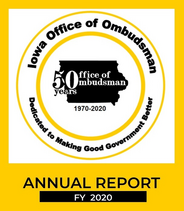The COVID-19 pandemic tested state and local governments in ways never imagined, and the proof was in the complaints. The Iowa Office of Ombudsman received a surge of citizen complaints on all manner of issues related to COVID: slow decisions on unemployment claims, the closure of public buildings, difficulties in access to social services – even a stoppage of garbage collection. The challenges were detailed in the Ombudsman’s fiscal year 2020 annual report, released today.
Ombudsman Kristie Hirschman said COVID-related problems were particularly acute in the initial months of the crisis, as many government offices took drastic safety measures. Mail was held for decontamination and meeting rooms were shuttered, while inmates were confined to their cells for extended periods of time. Business closures and restrictions led to a spike in unemployment claims, which required the hiring and training of temporary staff. Many callers expressed frustration with the inconsistent answers they received to their questions about their claims.
Despite these difficulties, the Ombudsman generally found that agencies took thoughtful and practical approaches to continuing operations while preventing the spread of the virus. When ombudsmen identified repairable problems and made suggestions to rectify them, most officials were receptive and responsive.
As reported in the past, Hirschman said, staffing shortfalls throughout government continue to put citizens at risk. Two major investigations released by the Ombudsman in 2020 determined that excessive workloads contributed to lapses by the Iowa Department of Human Services (DHS) in the oversight of homes where two teenage girls starved to death. Summaries of the investigations, which resulted in 27 recommendations to improve Iowa’s child-welfare system, are included in the Ombudsman’s report.
“As a society, we often fail to recognize the critical nature of many government services until something goes tragically wrong,” Hirschman said. “Once again, I urge Iowa’s city councils, county supervisors, and state agency directors to be proactive and to take ownership of their responsibilities. Do what is necessary to ensure that the vulnerable people who depend on your services can count on you.”
The Ombudsman is a good-government office that accepts complaints from citizens who believe that a state or local government agency has acted unfairly, unreasonably, inefficiently, or contrary to law, rule, or policy. The Ombudsman has the authority to investigate complaints, but more often tries to resolve disagreements or misunderstandings informally and cooperatively. Hirschman and her office’s 12 assistants are impartial and objective in their reviews of complaints.
All told in FY2020, the total number of complaints and information requests to the Ombudsman increased for the sixth consecutive year, to 5,665, the report said. The office saw significant numbers of new complaints against city government, DHS (including its Managed Medicaid programs), the Iowa Department of Corrections, and the Iowa Board of Parole.
The Ombudsman’s report features a sampling of some two dozen cases that its staff investigated during the year, and a historical retrospective on the office, which marked its 50th anniversary in 2020.
Source: State of Iowa - Office of Ombudsman, USA

